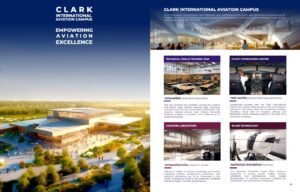
CLARK FREEPORT ZONE — The Clark International Airport Corp. on Monday announced a new initiative aimed at producing globally-qualified and high-performing personnel that will meet the strong global demand for aviation-industry workers and professionals.
The CIAC said the agency’s business ventures team was directed to roll-out plans to build the aviation campus with comprehensive curricula and state-of-the-art facilities strategically situated near the Clark International Airport inside the government-owned civil aviation complex.
In a 2023 Aviation Talent Forecast by CAE Inc., a Canadian aviation training service provider, it was estimated that within ten years, around 1.3 million civil aviation professionals will be needed, which includes 284,000 new pilots, 402,000 new technicians, and 599,000 new cabin crew staff.
The CIAC’s aim is to position Clark as the nation’s lead source of globally-qualified and high-performing aviation professionals such as skilled pilots, air traffic controllers, aeronautical engineers, aircraft mechanics, radio specialists, and ground support executives and operators.
The CIAC is following the lead of Transportation Undersecretary Roberto C.O. Lim who, earlier this month, said the Department of Transportation is partnering with various aviation schools to establish specific programs that will inspire young people to pursue careers in aviation and aerospace, noting that the current global shortage of aviation personnel presents a unique opportunity for individuals seeking long-term careers in the field.
Lim then cited the upcoming CIAC’s Asia Pacific Aviation Campus, and other initiatives such as Airbus’ proprietary training program, the Airbus Competence Training Academy, along with the Philippine State College of Aeronautics’ national aviation campus and the Civil Aviation Authority of the Philippines’ Civil Aviation Training Center.
The CIAC said the Philippines’ civil aviation education needs an industry upgrade, starting with reputable and comprehensive pilot training programs, along with skills training in components and assembly manufacturing which will expand into production engineering, procurement and distribution.
The government-owned firm also noted the aviation campus will redefine the aviation landscape in the country, provide exceptional opportunities and empower the next generation of Philippine aviation professionals.
The campus will be equipped with technical skills training colleges, research centers and laboratories, a flight operations center, and in-air technology with simulation facilities, a cutting-edge educational and training hub and fostering excellence and innovation in aviation.
As it stands, three of the world’s largest MRO providers are in Clark—Singapore Engineering, Lufthansa Technik, and Hong Kong’s Metrojet Engineering—establishing Clark’s readiness and foothold in the aviation industry and gearing the Philippines to be a key player in the region.
The aviation complex is being managed by CIAC and is currently home to the privately-run Clark International Airport, the mixed-use business district Clark Global City, and around 50 locators that include logistics and aviation-related businesses.



